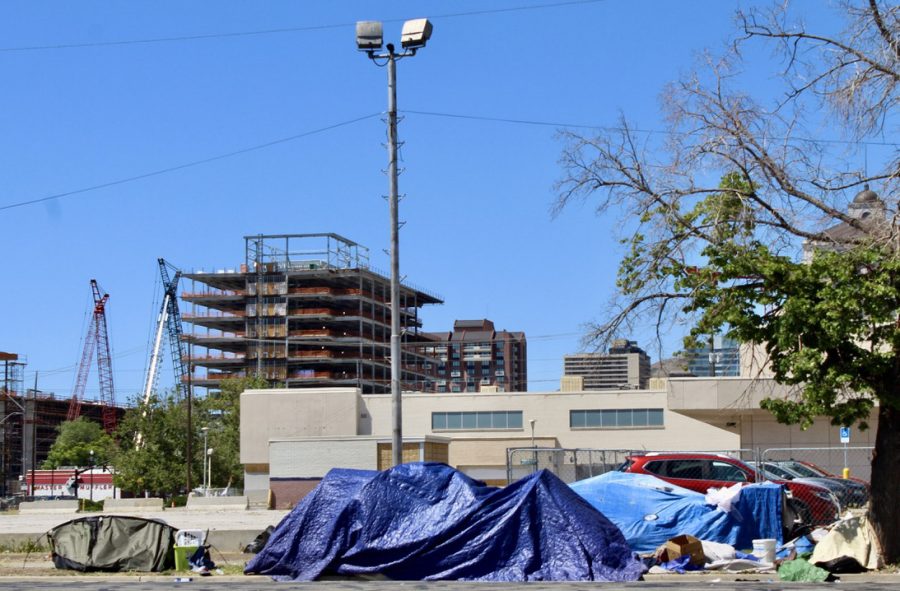Shadley: Utah Must Raise the Minimum Wage
A tent city built by the homeless in Salt Lake City on Sunday, May 30, 2021. (Photo by Brooklyn Critchley | The Daily Utah Chronicle)
June 2, 2021
The United States established the minimum wage in 1938 with the Fair Labor Standards Act, designed to create a minimum standard of living for all workers. That aim assumes that workers should make enough money working full-time to support themselves, but 70% of adults participating in Medicaid and Supplemental Nutrition Assistance Program (SNAP) work full-time. If the full-time minimum wage cannot meet basic nutritional and healthcare needs, then it fails to provide a minimum standard of living.
The minimum wage was originally intended to provide bargaining power for those with the least economic power in our society. Without any additional bargaining power, workers must accept the minimum wage. That’s acceptable in a society where the minimum wage actually provides for a reasonable standard of living. But at $7.25 an hour, residents of Salt Lake City earn an unlivable wage and employers financially benefit from paying such low wages.
The only way to stop the exploitation of workers and give them a dignified existence is to raise the Utah minimum wage so that it’s in line with the living wage in each county. For one adult with no children in Salt Lake City, that’s $15.07 an hour. And Utah’s minimum wage should reflect that.
Life on Minimum Wage
Someone working full-time in Salt Lake City for the minimum wage would expect to make $14,500 a year, or about $1,200 a month, at 40 hours a week and 50 weeks a year. This falls barely above the single-person poverty rate of $12,880, and below the single-parent poverty rate of $17,420. Roughly half of that monthly income will be spent on rent, as the search for studio apartments on Apartments.com returned only 3 studio apartments in Salt Lake City under $800, all of which were $675, as of May 31. While utilities vary from apartment to apartment, most people can expect to pay at least $100. According to calculations, that leaves $425 to pay for everything other than housing for the month.
With a full-time job, phone service and transportation are requirements. Since affording a car is basically out of the question, a monthly pass from UTA for $85 a month seems like the best option. The cheapest phone service, which still requires the customer to purchase a phone, is Mint Mobile at $15/month for 4GB of data.
The minimum recommended budget for food in Salt Lake City is around $220 per month, or $7.10 per day. At that budget, nearly every meal will likely be home-cooked, requiring additional hours of domestic work for someone already working full-time. After all of the necessities, roughly $105 remains each month to cover clothing, hygienic goods, entertainment, savings (if at all) and any unexpected expenses that might occur.
Utah’s Representatives Refuse to Raise the Minimum Wage
This repetitive, dehumanizing life is largely a choice — not for those living it, but for Utah’s legislators. In the 2021 General Session of the Utah State Legislature, a bill was once again proposed to raise Utah’s minimum wage. House Bill 361, a rather milquetoast attempt at raising the minimum wage, would have raised Salt Lake City’s minimum wage to $11.75 an hour by 2027.
With housing costs, inflation and other costs of living increasing by then, $11.75 does virtually nothing to prevent the already abysmally low quality of life on minimum wage from dropping. Even then, this unambitious bill garnered little support in the Utah Legislature and failed to pass.
With the state minimum wage unlikely to change, a raise in the federal minimum wage is Utahns’ best chance at a higher minimum wage. However, Sen. Mike Lee has repeatedly signaled his opposition to a $15 minimum wage, even when it’s still below the calculated living wage in Salt Lake City.
Sen. Mitt Romney, while not in favor of a $15 minimum wage, has signaled his intention to work to increase the minimum wage to around $10 to $12. While this wouldn’t quite equal a living wage in Salt Lake City, it would come significantly closer in some of Utah’s other counties, like Iron County, where the living wage is $12.80. Still, it’s disappointing that Utah’s federal representative most supportive of raising the minimum wage still hesitates to support a living wage for his constituency.
Our Only Way Forward
Over the past 12 years, Utah’s workers have seen their cost of living rise dramatically and their wages remain stagnant. Utah’s representatives repeatedly refuse to raise the minimum wage while more and more working Utahns lead a subsistence lifestyle without any chance of improving their situation.
In the Beehive state, we apparently value work, yet seemingly undervalue our workers. While it’s unclear if the federal minimum wage will increase, that shouldn’t be the only way for change to happen. The Utah State Legislature must finally take action on increasing the minimum wage so that it matches the living wage in each of Utah’s 29 counties.










Terri Low • Sep 16, 2021 at 5:18 pm
I totally agree with Shadley. While currently I am not working outside the home, I do agree with everything Will has stated on Minimum wage. RAISING MINIMUM WAGE DEFINATELY NEEDS TO BE A TOP PRIORITY IN UTAH!!!
A few years ago my husband needed emergency surgery for Diverticulitis, where he had 10 feet of his upper intestine taken out. We hadn’t had medical insurance for years, and still don’t(cannot afford it!), but because he couldn’t work @the time and my income was just the minimum wage, my husband qualified for medical financial assistance. Whereas a few years later, I developed a Uterine Prolapse that I had no choice but to just deal with for about a year and a half due to lack of insurance and not being eligible for any type of assistance due to the income we were both bringing in. My prolapse worsened and I could not stand on my feet without my uterus literally falling out. It took my husband taking me to the emergency room in order for me to get medical help. After my surgery, a hysterectomy, I was still unable to qualify for medical financial assistance because my husband made to much income. Imagine that. And we were and still are today living paycheck to paycheck, and most months we are paying a monthly $50extra on our rent because it’s paid a day or two late. I have not worked since this surgery, and my husband is now driving OTR to make enough for us to survive, still paycheck to paycheck. I, personally, would like to invite ALL Utah politicians, especially Mike Lee and Romney to step down to the level of the people they supposedly represent, putting all politics aside, and try for 1 month to survive on the income the rest of us have. Actually, I would challenge every politician to live the life of a homeless person/minimum wage earner for a month. One month.
It’ll never happen, and I’m just wasting my breath. Minimum wage in Utah will NEVER meet the Cost of Living, and the count of the Homeless will continue to rise and be ignored. So, there you go, Mike Lee, actually all politicians… Stand up and be proud of your ignorance toward those of us you say you represent. You won’t actually listen to the people of Utah, not the ones living @and below poverty level, but you’ll continue playing politics with our lives so long as you’re the ones who benefit. Absolutely pathetic and sad, and I could go on… but I’m done.
Thanks,
Terri Low